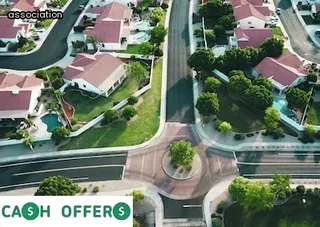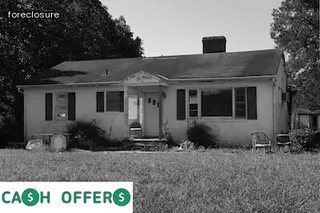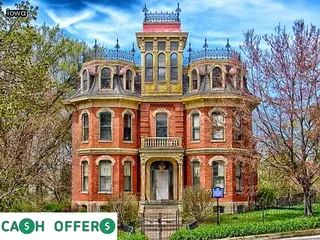When homeowners in Iowa choose to purchase a property that is part of an HOA, they are committing to pay their dues each month. If these fees go unpaid, the homeowner can face severe consequences.
The most extreme repercussion is foreclosure, which means the HOA will take ownership of the home. While this happens rarely, it is still a possibility and one that homeowners must understand before entering into any agreement with the HOA.
Before making a decision on whether or not to purchase a property with an HOA, potential buyers should do as much research as possible about the association and its policies regarding delinquent payments. It is also important for buyers to know what type of foreclosure process the association uses and if there are any legal protections available for them should they fail to make their payments.
Being aware of these facts can help avoid serious issues down the road, such as hoa foreclosure in Iowa and home ownership loss.

Homeowners Associations (HOA) are common in many parts of the country and often charge homeowners a fee for services, such as maintaining common areas. When a homeowner does not pay their HOA fees, the association may take steps to collect them, including putting a lien on the property and even foreclosure.
In Iowa, if an HOA decides to foreclose on your home it can be a complicated process. It is important to understand how HOA fees work so that you can stay current with your payments and avoid foreclosure.
Generally speaking, HOAs assess fees based on the number of units in a development or the size of an individual lot. The amount of fees charged will vary by association and may also depend on whether the HOA provides any additional services such as snow removal or landscaping maintenance.
As with most things related to real estate, it is important to read through all HOA documents carefully before signing anything or agreeing to pay any fees. Additionally, if you have any questions about fees or other aspects of your agreement with an HOA you should speak with an attorney who specializes in real estate law before making any decisions that could put your home at risk of foreclosure.
Regular assessments are the fees that Homeowners Associations (HOA) charge to maintain common facilities such as roads, parks, and other amenities. These fees are typically assessed on a monthly or quarterly basis.
Special assessments, however, are additional fees that an HOA may charge its members when a project arises or large repair is needed in the community that exceeds the budget of the regular assessments. In Iowa, special assessments may be issued for major maintenance projects such as roof repairs, repaving streets, or replacement of playground equipment.
When an HOA issues a special assessment it must provide written notice to all homeowners and allow them at least 30 days to pay the fee before any foreclosure proceedings can begin. Hoa foreclosure in Iowa can only occur if homeowners fail to pay their special assessment fees after being given ample time to do so.
Consequently, it’s important for homeowners in Iowa to understand both regular and special assessments and plan accordingly for payment if one is ever issued.

HOA foreclosures are an unfortunate reality for some Iowa homeowners who fall behind on their HOA dues. When these dues go unpaid, the HOA can place a lien against the property and ultimately take ownership of it through a foreclosure process.
This can be devastating for the homeowner, who may not be aware of the potential consequences of falling behind on payments until it’s too late. HOA liens significantly impact property ownership because they give HOAs a large amount of legal power over their members.
Not only can they take control of properties through foreclosure, but they also have the ability to impose hefty fines and penalties for late or delinquent payments. Additionally, any unpaid fees become part of the property's title, meaning that all future owners are responsible for repaying them before they can assume full ownership rights.
For this reason, it is important to stay current with HOA dues and understand the implications of failing to do so in order to avoid any negative impacts on your property ownership rights in Iowa.
The foreclosure process for an HOA lien in Iowa is a complex one. When an HOA has placed a lien on the home, they can foreclose if the homeowner fails to pay any fees or dues that are due.
The first step in the foreclosure process is for the HOA to file a lawsuit against the homeowner and serve them with notice of the suit. This is when the homeowner will be informed that they are being sued by their HOA, and they must take action within a specific time frame.
After this step, the court will issue an order of sale, allowing the HOA to put the property up for auction. In some cases, it is possible for homeowners to work out a payment plan with their HOA to avoid foreclosure, but this must be done within the specified timeline set forth by law.
If neither of these options are successful, then a sheriff's sale will take place and ownership of the property will be transferred from the homeowner to whoever purchases it at auction. It’s important for those facing an HOA foreclosure in Iowa to understand their rights and obligations so that they can make informed decisions about how best to move forward.

Foreclosures resulting from Homeowners' Association (HOA) liens are a unique situation in Iowa, with implications for mortgages and other liens. When an HOA forecloses on a homeowner, they often have the right to take possession of the home and then sell it to recover unpaid assessments.
This can have grave consequences for homeowners who have mortgages or other liens against their property because these loans remain in place even when the HOA takes over. Depending on the amount of money owed to the HOA, these loans could exceed the value of the home and leave homeowners facing sizable debts that must be paid off before they can regain ownership.
In addition, even if a mortgage lender is able to establish a new loan with an investor or another lender, they may still be liable for any additional costs associated with transferring title to the new loan holder. As such, it is important for homeowners to understand both their rights and obligations regarding HOAs before taking out any kind of loan against their residence.
When it comes to homeowners associations (HOAs) in Iowa, many homeowners may not realize they are at risk of foreclosure. With the rise in foreclosures due to missed payments, many HOAs are utilizing their right to foreclose on a home if payments are not made.
For those who have fallen behind on their HOA payments and fear that their home may be at risk of foreclosure, there are a few steps they should take right away. Seeking legal advice is always the first step when faced with an HOA foreclosure as there may be options available to help avoid or delay the process.
It is also important to understand all the details of your HOA agreement, as this will provide clarity on any fines or late fees owed that could contribute to the total amount due. In addition, communicating directly with the HOA board can increase transparency and potentially lead to an understanding that could result in increased leeway for meeting payment deadlines.
Finally, although it may seem like a daunting task, staying informed about your state's housing laws can help equip you with knowledge of potential protections against HOA foreclosure.

If an HOA in Iowa forecloses on a property, it will have an immediate and negative impact on the homeowner's credit score. The foreclosure will remain on the homeowner's credit reports for seven years, and can cause severe damage to their credit score.
This can in turn make it difficult for the homeowner to obtain new lines of credit or secure loans for cars, homes, education, or other major purchases. Foreclosure may also prevent homeowners from refinancing at a better rate or obtaining lower interest rates on future loans.
Additionally, as lenders consider foreclosure a financial risk, they may charge higher interest rates when issuing new loans. This can add significant costs to the homeowner's future borrowing and purchasing power.
Finally, foreclosure can negatively impact a person's ability to rent housing or purchase insurance policies if their credit score has been damaged by an HOA foreclosure in Iowa.
If you are facing an HOA foreclosure in Iowa, it is important to understand the legal strategies available to avoid or recover from it. In some cases, you may be able to negotiate a payment plan with the association.
If this is not possible, seeking help from a lawyer may be necessary. Your attorney can review your specific circumstances and develop a plan of action that works best for you.
Depending on your situation, they may suggest filing a lawsuit against the association or requesting mediation with them. Additionally, if you have already been foreclosed upon, your lawyer can help you explore options to overturn the foreclosure decision or assist in negotiations for re-entry into the home.
Being aware of your legal rights and options when dealing with an HOA foreclosure can help ensure that you take action in your best interest.

In Iowa, residents with Homeowners' Association (HOA) memberships are subject to the guidelines of state laws concerning HOA foreclosure. Laws pertaining to HOA foreclosure in Iowa dictate when and how an HOA can take a homeowner's property away from them.
Depending on the circumstances, an HOA may be able to take possession of a property for failure to pay dues or for violating other terms of the membership agreement. It is important that property owners understand the laws in place concerning their rights and responsibilities as a member of an HOA.
Additionally, they should also have knowledge of what their options are should they be faced with an HOA foreclosure situation. Knowing the legalities involved in such a situation can help homeowners protect their interests and make sure they do not lose their home if they are unable to comply with the terms or conditions set forth by their HOA.
When it comes to HOAs, solar rights and easements can play a major role in determining whether homeowners are able to keep their homes or not. Solar easements are legal agreements between two parties that guarantee the right of uninterrupted sunlight over a certain property, while solar rights refer to the ability of a homeowner to install solar energy systems on their property without having to worry about obstruction from neighboring properties.
In Iowa, HOAs have the power to enforce restrictions against homeowners when it comes to installing or using solar energy systems on their property. This means that HOAs are able to take away the right of a homeowner to use their land for solar purposes if they fail to abide by HOA rules and regulations.
It is important for those living in an HOA community in Iowa to understand how these laws could potentially affect them so that they can protect their homes from foreclosure and other financial hardships caused by losing access to solar energy systems.

Navigating the government regulations surrounding HOAs can be complicated, particularly when it comes to foreclosure. In Iowa, HOAs have the right to foreclose on a property if a homeowner falls behind on their fees and fails to cooperate with the organization in finding a solution.
However, there are certain steps that must be taken before an HOA can take ownership of a home. The HOA must provide written notice of any delinquent payments as well as an opportunity for the homeowner to cure any debt within 30 days.
If this does not occur, the HOA must then file a lien against the property and wait for all applicable laws to be followed before taking action. Additionally, HOAs are subject to state laws regarding foreclosure proceedings and collection of delinquent fees.
It is important for homeowners to seek legal advice from an experienced attorney if they find themselves in this situation in order to ensure that their rights are being protected throughout the process.
When it comes to Hoa Foreclosure in Iowa, understanding local ordinances and regulations is a key component to finding relevant documents and information about your Homeowners Association (HOA). It's important to know what rights you have as an HOA member and how the foreclosure process works.
One of the best ways to start researching is by looking up any public records related to your HOA. These records are typically available through county or city offices and can include anything from meeting minutes, policies and procedures, budgets, contact information, and more.
Additionally, you should look at any documents provided to you when you purchased your home to determine if there are any restrictions that may affect foreclosure proceedings. Finally, don't forget to reach out directly with your HOA board members or management company to ask questions or get clarification on any documents they provide.
With proper research and knowledge of local regulations, you'll be better prepared to make informed decisions regarding your HOA foreclosure in Iowa.

One of the most important strategies for preventing late payments and avoiding foreclosure from an HOA is to stay organized. Homeowners should keep up with their paperwork and payment records, so they are aware of when payments are due and can take action before it’s too late.
It’s also essential to have a plan for covering any unexpected costs that may come up in order to make sure the HOA dues remain current. Additionally, homeowners should work closely with their HOA management to set up a payment plan if they are having difficulty paying on time.
If a homeowner has already fallen behind on payments, they should contact the HOA as soon as possible to discuss what options are available going forward. Finally, it is important not to ignore notices sent by the HOA or court appearances as these could lead to an even more serious situation such as a foreclosure.
By being proactive, staying organized, and communicating with the HOA management, homeowners in Iowa can prevent or contend with late payments and avoid foreclosure from an HOA.
Homeowners associations (HOAs) in Iowa can take a homeowner's property if the homeowner fails to pay their dues and assessments. This can be a serious situation for the homeowner, but there are steps that may be taken to prevent or delay foreclosure.
Homeowners who believe they are being unfairly charged fees or assessments have the right to appeal the charges. The first step is to review the HOA's governing documents and determine if there is any basis for challenging the charges.
If it appears that there is an unjustified fee or assessment, homeowners should contact the HOA board and explain why they feel it is improper and ask them to reconsider their decision. If they are unsuccessful in persuading the board, it is possible to seek legal advice or file a formal complaint with state regulatory agencies such as the Iowa Department of Public Health.
In some cases, it may even be necessary to go to court if negotiations with the HOA do not produce an agreement that satisfies all parties involved. It is important for homeowners to understand their rights and options when confronted with potential HOA foreclosure in Iowa so they can take action as soon as possible in order to protect their home from being seized by an HOA.

When it comes to an HOA foreclosure in Iowa, many homeowners are left wondering if it is even possible for the HOA to take away their home. Fortunately, there are several alternatives to litigation that can be explored in order to reach an amicable resolution with the HOA.
Mediation allows both parties to agree upon a solution that works for everyone involved and can often result in a more equitable outcome. Arbitration is another option where both sides present their case to a third-party neutral arbitrator who will make a decision on the matter.
Collaborative law is also available and involves both parties working together with legal professionals in order to find common ground and move toward an agreement without resorting to legal action. Lastly, negotiation can help bring about an agreement without any court involvement.
By exploring these options, homeowners may be able to resolve disputes with their HOAs without the need for expensive and lengthy litigation.
If you don't pay Homeowners Association (HOA) fees in Iowa, the HOA has the right to foreclose on your property. This means that the HOA can take ownership of your home if you fail to meet your financial obligations.
You will then be required to pay back all outstanding HOA fees, including any late payment penalty or interest, plus court costs and other administrative costs. In addition, the foreclosure process can have a negative impact on your credit score and ability to obtain future loans or mortgages.
It is important to understand that HOA foreclosures in Iowa are a last resort for HOAs and must be approved by a judge before they can move forward with taking possession of a property. Homeowners should always strive to keep up with their payments as soon as possible in order to avoid potential foreclosure proceedings.

The Iowa legislature is responsible for regulating Homeowners Associations (HOAs) in the state. The main regulation is found in Chapter 562A of the Iowa Code, which requires that all HOAs register with their respective county recorder and pay fees to the state.
All HOAs must also follow certain rules and regulations set forth by their county as well as any applicable local ordinances. In addition, HOAs must adhere to the terms of their governing documents and may be subject to fines or other penalties if they fail to do so.
While HOAs are allowed to foreclose on a property due to unpaid dues or fines, they are not permitted to take possession of the property or evict its occupants without approval from a court of law. Ultimately, it is up to each individual HOA to determine how they will handle delinquent payments and foreclosure proceedings within their own parameters, but all must adhere to Iowa's laws and regulations when doing so.
In Iowa, dissolving a homeowners association (HOA) is not as straightforward as it may seem. The process typically begins with filing a petition of dissolution with the Iowa Secretary of State.
To be successful, the petition must be signed by all members of the association or have approval from a majority of them. Once filed, the Secretary of State's office will investigate to determine whether the conditions for dissolution have been met and if there are any outstanding debts that need to be paid before dissolution can take place.
In some cases, the Homeowners Association may need to file a lawsuit in order to dissolve itself if no agreement can be reached among its members. If an HOA is dissolved in Iowa, it will no longer exist and all its assets and liabilities, including any potential foreclosure proceedings against its members' homes, will cease to exist.
This dissolution process is necessary for homeowners who wish to be freed from their HOA obligations and avoid foreclosure proceedings initiated by their HOA.
Yes, Iowa does have Homeowners Associations (HOAs). HOAs are responsible for managing the common property of a residential subdivision or condominium complex.
HOAs can be organized by the homeowners themselves or by a property management company. An HOA can enforce rules regarding the use of the common areas and may assess fees on residents in order to pay for upkeep and maintenance.
In Iowa, if an HOA is not paid, it can foreclose on a homeowner's property and take ownership of it. It is important for any potential homeowner in Iowa to understand the rules and regulations that come with living in an area governed by an HOA, so they are aware of what could happen if they do not pay their dues.